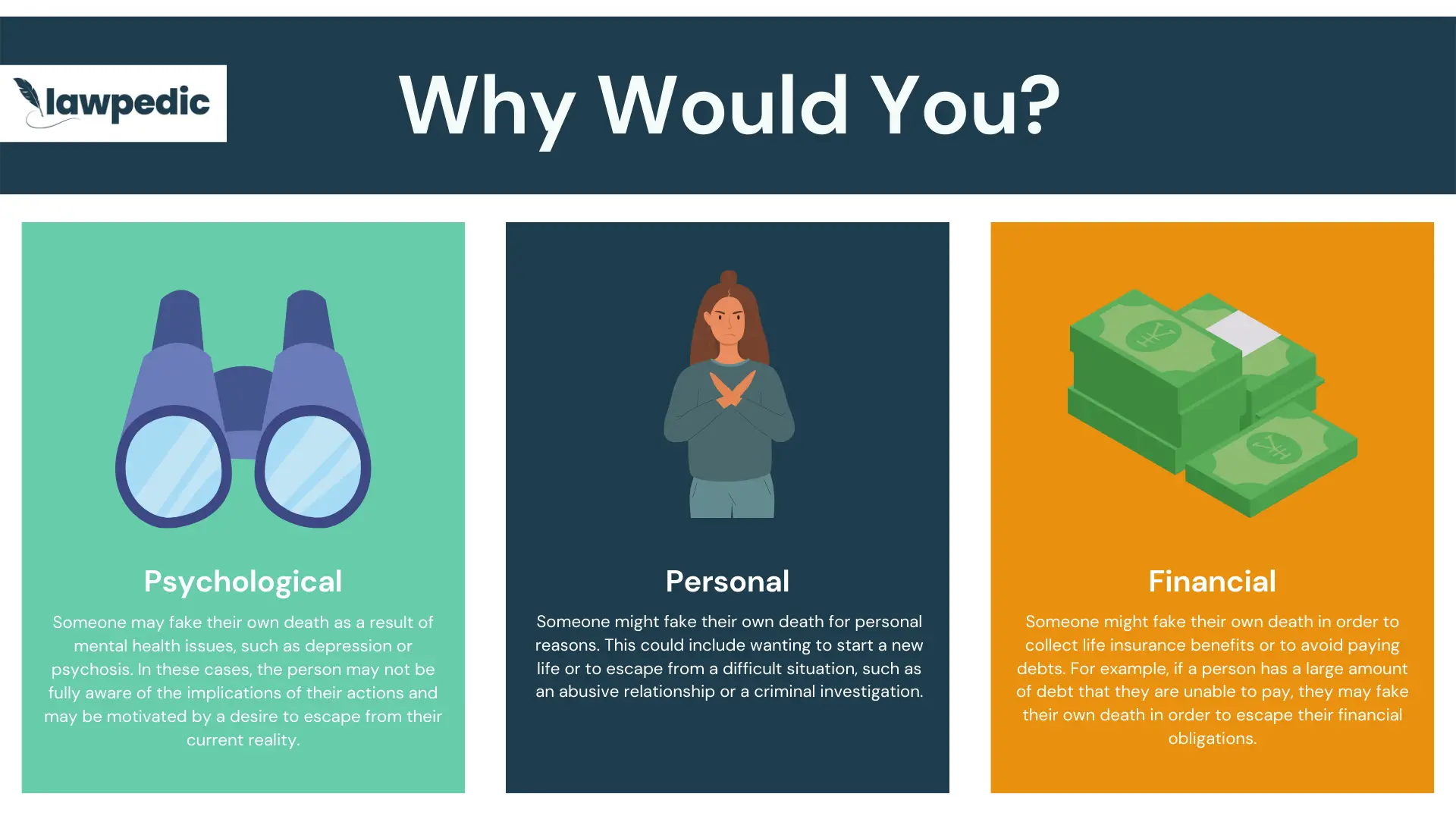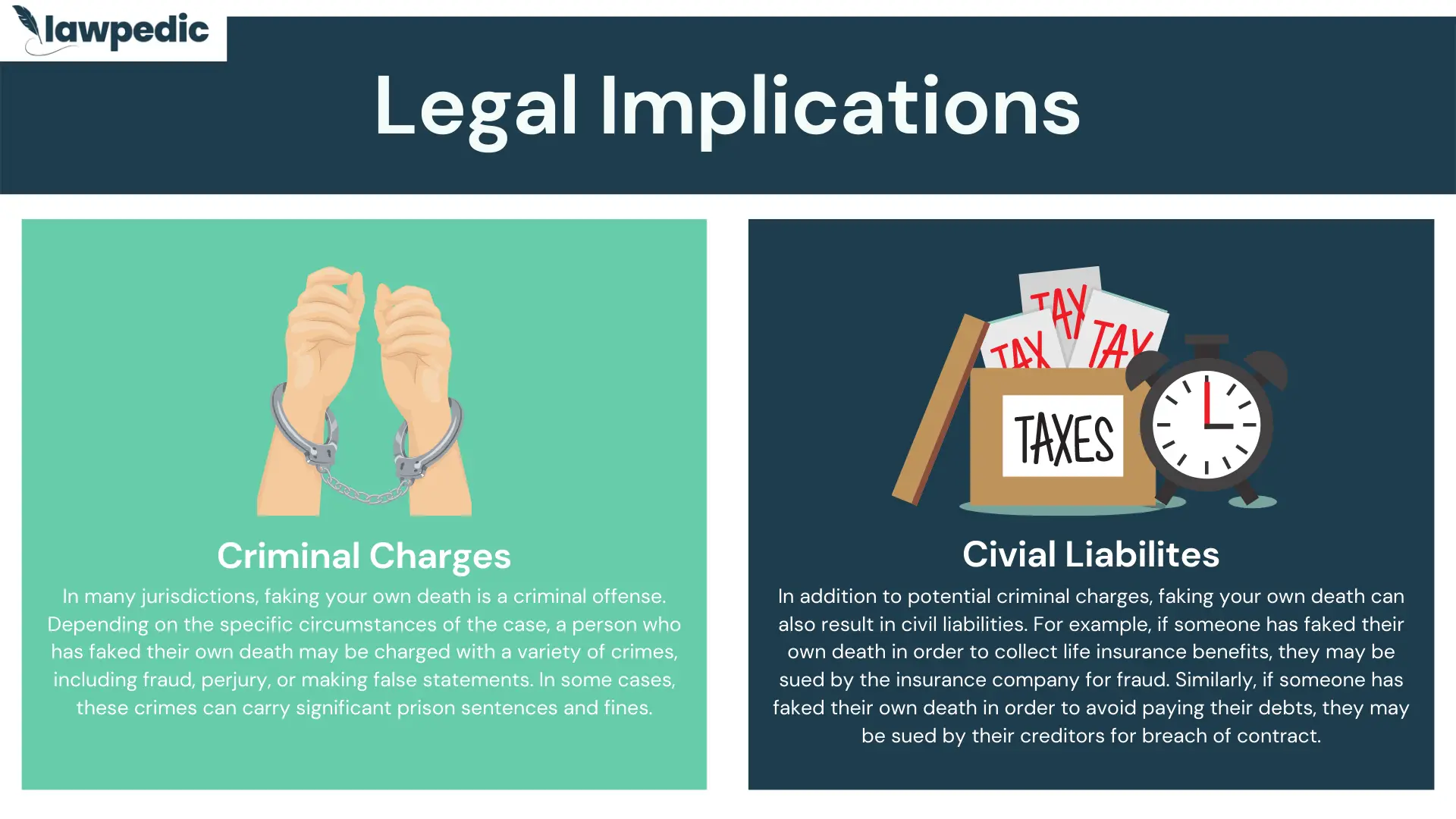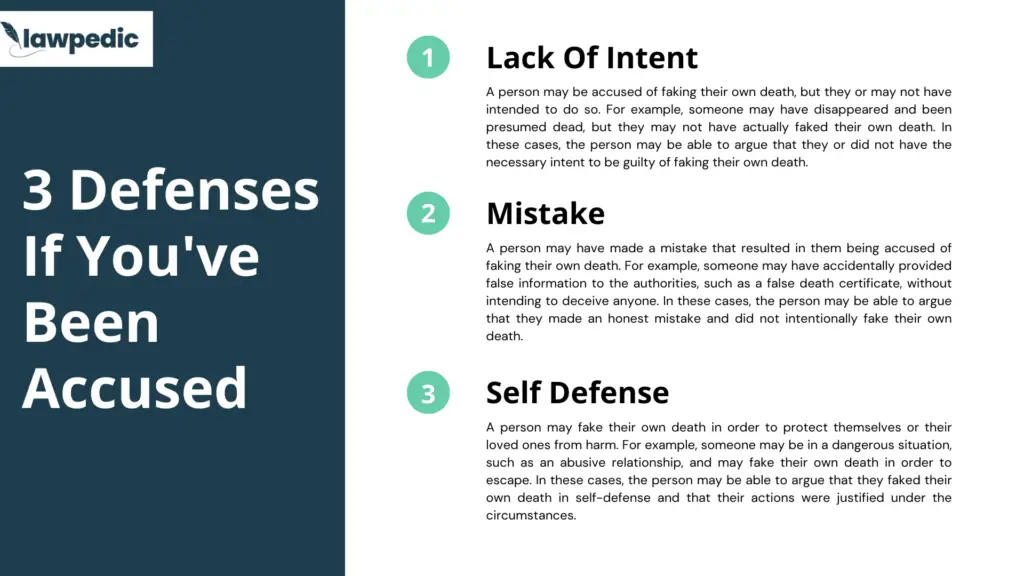Quick Summary:
Faking your own death is not illegal in and of itself. However, there are serious consequences that can result from faking your own death. For example, if someone goes through the process of faking their death and changing their identity, they may still be legally responsible for any debts or contracts that they had before their fake passing.
Usually, if someone is faking their death it’s to get away from something. Which is most likely not something they want to deal with legally. Continue reading to learn more about why and the legality of faking your own death.
What Exactly is Pseudocide (Fake Death)?
Pseudocide, often referred to as fake death, false death, or staging one’s own death, is the practice of pretending to have died in order to deceive others. It can happen for a number of reasons, including abandoning relationships or situations, avoiding prosecution or debts, and reaping financial advantages from life insurance and inheritance.
Typically, there are a few different ways to accomplish this:
- Fabrication of death-related evidence (such as a fake obituary)
- Staging the death to appear like an accident or natural occurrence
- Hiring a “body double” or witness to perform the act.
Because there is no explicit rule against it, it is not unlawful to simulate your own death. However, that does not imply that there are no repercussions for pseudocide.
Why would someone fake their own death?

There are many potential reasons why someone might choose to fake their own death. Some common reasons include:
- Financial motivations: In some cases, someone might fake their own death in order to collect life insurance benefits or to avoid paying debts. For example, if a person has a large amount of debt that they are unable to pay, they may fake their own death in order to escape their financial obligations.
- Personal motivations: In other cases, someone might fake their own death for personal reasons. This could include wanting to start a new life or to escape from a difficult situation, such as an abusive relationship or a criminal investigation.
- Psychological reasons: In some cases, someone may fake their own death as a result of mental health issues, such as depression or psychosis. In these cases, the person may not be fully aware of the implications of their actions and may be motivated by a desire to escape from their current reality.
Overall, the reasons why someone might choose to fake their own death can vary greatly and may be driven by a combination of financial, personal, and psychological factors.
The legal implications of faking your own death:

Faking your own death can have serious legal implications, both in terms of criminal and civil liabilities. Some potential legal implications of faking your own death include:
- Criminal charges: In many jurisdictions, faking your own death is a criminal offense. Depending on the specific circumstances of the case, a person who has faked their own death may be charged with a variety of crimes, including fraud, perjury, or making false statements. In some cases, these crimes can carry significant prison sentences and fines.
- Civil liabilities: In addition to potential criminal charges, faking your own death can also result in civil liabilities. For example, if someone has faked their own death in order to collect life insurance benefits, they may be sued by the insurance company for fraud. Similarly, if someone has faked their own death in order to avoid paying their debts, they may be sued by their creditors for breach of contract.
What to do if you’ve been accused of faking your own death?

If someone has been accused of faking their own death, there are several potential defenses that they may be able to raise. Some common defenses to allegations of faking one’s own death include:
- Lack of intent: In some cases, a person may be accused of faking their own death, but they or may not have intended to do so. For example, someone may have disappeared and been presumed dead, but they may not have actually faked their own death. In these cases, the person may be able to argue that they or did not have the necessary intent to be guilty of faking their own death.
- Mistake: In some cases, a person may have made a mistake that resulted in them being accused of faking their own death. For example, someone may have accidentally provided false information to the authorities, such as a false death certificate, without intending to deceive anyone. In these cases, the person may be able to argue that they made an honest mistake and did not intentionally fake their own death.
- Self-defense: In some cases, a person may fake their own death in order to protect themselves or their loved ones from harm. For example, someone may be in a dangerous situation, such as an abusive relationship, and may fake their own death in order to escape. In these cases, the person may be able to argue that they faked their own death in self-defense and that their actions were justified under the circumstances.
Overall, the specific defenses that may be available to someone who has been accused of faking their
Is Faking Your Own Death Ever Worth It?
Faking your own death may seem like a solution to escape certain problems, but it often comes with more consequences than anticipated. Before making any rash decisions, consider alternative solutions and the potential consequences that could come with pseudocide. It may be tempting to start over under a new identity, but the stress and difficulty of constantly living a lie may not be worth it in the long run.
Most of the time it seems that people faking their own death are running from something. If I was personally able to give them advice I would say to deal with your problems. There aren’t really any problems that can’t be fixed. Well, maybe running from the mob but I’m not an expert on that one.
When to seek legal advice
If you are considering faking your own death, it is important to seek legal advice before taking any action. Faking your own death can have serious legal implications, and it is important to understand the potential risks and consequences before proceeding. A lawyer can provide you with expert advice on the legal implications of faking your own death and can help you to understand the potential criminal and civil liabilities that you may face.
Additionally, a lawyer can advise you on any relevant laws or regulations that may apply in your jurisdiction and can help you to understand the potential defenses that may be available to you if you are accused of faking your own death. Overall, it is important to seek legal advice if you are considering faking your own death in order to understand the potential risks and consequences and to protect your rights.
